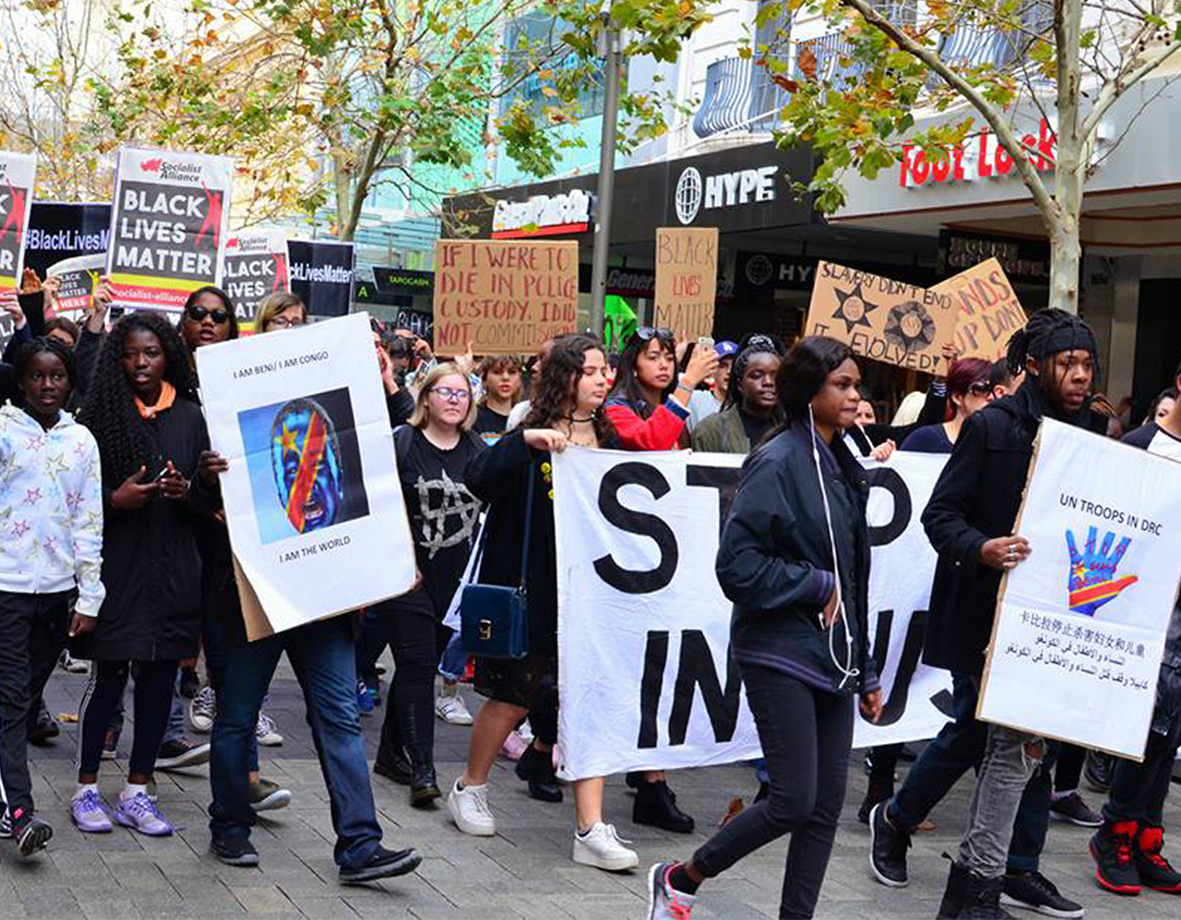Today marked the first Black Lives Matter rally in Perth. The peaceful rally follows in the footsteps of the movement started by Alicia Garza, Patrisse Cullors and Opal Tometi – three black queer women who mobilised the black community following the death of Trayvon Martin in July 2013, after the black youth was shot, unarmed, by neighbourhood watch volunteer George Zimmerman. Three years later, the Perth chapter of this movement has worked to set out very clear goals and demands for the people of our nation as well as those in government. These demands include “protecting Indigenous Australians in and out of custody”, “acknowledging and educating people about Australia’s black history” and “building a more community-oriented police force”. Following the event, I was able to talk to one of the rally’s organisers, Christelle Barrere-Collet, to ask her about the movement and its goals.
What are your thoughts on the rally today?
Well, I think it was really productive. People turned up as promised and we managed to get all our messages across without any drama or any opposing groups as we were expecting. So it went better than I thought.
That’s really great. One thing I noticed was that you had a really strong cultural message of solidarity from the Indigenous Australian community.
Definitely.
How important has their contribution been to this movement?
Their contribution is crucial. Really, we are basing ourselves on them and their knowledge – especially their approval to have this rally on their land. They were our guidance on how to set up this rally – how to make it productive, and how to address black issues. Because they’ve been here; they’ve been looking after this land. Their contribution was the most important for the success of this rally.
What are your thoughts on the future of this movement? Where do you want to see it go next?
I see the next move as going to the government and seeing actual change – because we have actual demands. It’s not just talking at a rally and seeing that people are clapping. We are actually sending these demands to the relevant authorities, and we want to become a respected movement where we see change happening. And we want to talk to our local members who we are electing ourselves, and tell them that we are putting them in place to represent us, not just white people but black people also. We have to make sure that we are protected.
What are your thoughts on a lot of recent talk about micro-aggressions – things like cultural appropriation of black hairstyles. I noticed there were some white people with dreads at the rally. What are your thoughts on how they relate to the movement?
I think, the thing is, they need to come. For lots of people – because they are coming from a place of privilege – cultural appropriation is not an issue they have to worry about. They don’t have something that is sacred that we are trying to steal. The thing is, black people have suffered so much. For myself, I wear my hair naturally, and that’s a fight that I’ve had all my life. I’ve been told that my hair needs to be straightened, needs to be relaxed; I have to wear wigs to look like white people because my hair is not good enough. I am now reclaiming my identity and wearing my fro. I am rocking my braids. And then, when I see someone from a place of privilege, someone from a position that’s been mocking me for my hairstyle, imitating me for fashion – it hurts.
These people don’t get it because they don’t experience this kind of suffering. So it is good for them to come to this movement, because they get to hear our voices. Lots of these kinds of people, all the time, oppose cultural appropriation on online forums; they feel very challenged and they think, “Oh, why are you calling me racist? You know, I am wearing your dress because I like your culture”. But they don’t realise the implication of what they are doing. It’s actually having an emotional, spiritual and cultural negative impact on me so it’s good that they come. Come with your dreads, hear our voices, and get challenged and then maybe they’ll be like “Oh, okay!” and they’ll change. That’s how they’re gonna learn.
Before I leave, I’d just like to ask a bit about you. Tell me a bit about yourself.
A month ago, I celebrated my seven years in Australia. I was born in Mauritius but as I said earlier, my ancestors were stolen from Africa and brought to Mauritius as slaves, so it is not where I am from. It is where I was born. It is my foster land, not my motherland. Unfortunately, I don’t have the privilege to go on a website and check my ancestral history because my ancestors were brought over as slaves and there is no record of them so I have no idea where I am from. And this is something that is still affecting me today because I don’t have my father’s and my mother’s language and beliefs. I’m still straining to look for it. So, it is my dream to know exactly where I am from; I have been fighting for my identity.
Interview by Ishita Mathur


Dreadlocks are not solely a black/African hairstyle.
Who writes this bullshit? How are dread locks appropriation of black hairstyles? Blacks didn’t invent that shit, it came from the Greeks? Does this mean the stooge author who wrote this has to send an apology to the Greeks for not recognising their heritage? When is your next article out about blacks culturally appropriating Greek hair culture?